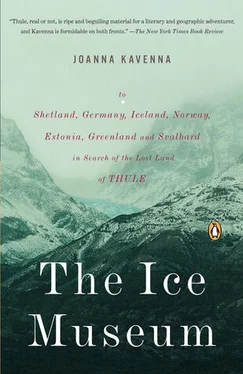For many it would have been a triumph, but Nansen was disappointed, a dark secret disappointment. He continued dining and dancing with the international explorers’ set, turning up in British society, later immaculate in ambassadorial robes, charming, a courteous dining companion, an elegant dancer. Internally, he was raging and melancholy, desperate for solitude, fearful of its effects. He was hardly pitiful; he was robust and strong, hailed as a hero by the Norwegians, showered with praise, paraded along the streets of Oslo and invited to lecture the formerly sceptical experts of the London establishment. Yet he was a moody Viking hero, his long moustache dragged down by the turn of his mouth, his fierce blue eyes expressive in later photographs of despair barely contained.
As I walked away from Fram , I was thinking again of Nansen’s quotation from Seneca. There were hundreds of stirring Thule quotes Nansen could have used. Nansen had used the lines at the start of his account of the journey on Fram ; he wrote for a captive audience, and his book was an immediate bestseller. The words seemed to spell out a sense of glory. Nansen had been to lands beyond Thule: the barren island he wintered on, a place beyond the earlier limits of the world. He had proved his theory that the Arctic regions would succumb to laws, to scientific calculation. If he hadn’t reached the Pole, he had gone further than anyone before him, and he had formed a reasonable idea of a portion of the globe that formerly lay in darkness.
But something in Nansen’s fixed stare made me think his Thule quotation might mean something else, something more ambiguous. There was a chance his quotation from Seneca was more like a personal code, a phrase that was only superficially jubilant. The play the quotation comes from, Medea , is a gory sequel to the story of Jason and the Argonauts, showing Jason and Medea at home, after they had eloped when Jason took the Golden Fleece. At the opening of Medea , Jason has found that living with a sorceress no longer suits him and is erring towards a dynastic marriage with the daughter of the King of Corinth. The marriage, Jason hopes, will bring him back into the establishment, away from the marginal brutality of Medea, who murdered half of her family to secure their escape. The characters are mostly unsympathetic—Jason is an unappealing hero and Medea is unhinged to a degree notable even in classical tragedy. When Seneca’s Medea realizes Jason is about to abandon her, she murders their children and hurls the bodies to him on the street below as she flies away in a chariot.
Interspersed with the bloodbath, a nostalgic Chorus intones about how much simpler it was when everyone stayed at home, happy on their own shores, living to a ripe old age on the fields of their ancestors, knowing only their home soil. No one then, the Chorus says, was able to navigate from the stars, but a time came when sailors began to understand the winds, and could spread their sails or bind them at the top, in order to speed themselves around the world. Jason’s ship, the Argo , which he took on his Fleece-quest, was one such nature-defying vessel. The Argo moved past Scylla, past the tempting songs of the Sirens. Since the Argo made this voyage, the Chorus says, things have become easier still, and a great ship like the Argo is no longer even required. Sailors are setting off in any ship they can find, wandering at will on the previously mysterious deeps. The Chorus complains that all the boundaries between nations have been removed, cities have set their walls in new lands, and nothing has been left where it previously stood. Everything has been mixed up, joined by the boats crossing the oceans, and ‘the Persians quaff the Elbe and the Rhine.’
After these observations, the Chorus presents its prophecy, as Jason and Medea’s marriage spirals into further destruction. The Chorus’s moral seems to be that no good comes of hubristic curiosity, from this haphazard mapping of the world. It makes Thule part of a strange premonition: ‘A time will come in later years when the Ocean will unloose the bands of things, when the immeasurable earth will lie open, when seafarers will discover new countries, and Thule will no longer be the extreme point among the islands.’ Set against the murderous finale of the play, the words suggest that the acquisition of knowledge and the craze for exploration have their dark side. With knowledge comes a terrible loneliness, as humans realize they are alone in the world, alone with their laws and cracked civilization. The last words of the play are Jason’s cry after Medea: ‘Go on through the lofty spaces of high heaven and bear witness, where thou ridest, that there are no gods.’ Jason’s triumph over the Ocean ends in a bloody flight from Pelias, and the bloody end of his marriage to Medea. There are no more mysteries, and no more gods in Jason’s world, after the Ocean has been crossed.
It was something of this that Nansen, a polymath who would have known the play he quoted, expressed in the Seneca line. Nansen’s use of the Seneca quotation could have been a simple rallying cry, a simple expression of optimism—the old mysteries would be outlawed, man would be supreme and lord of all he surveyed and so on. Daring insouciance, absolute confidence—Nansen’s party persona. But behind the quote, as under the slick surface of Nansen’s charm, lurked something more complex. Nansen asked what progress meant, what this surge of explorers struggling towards the north might mean for the old sense of mystery and wonder.
Standing beneath the boat again, I gazed at the gentle sides of Fram . A beautiful bow-legged bison of a boat, she sat squatly, surrounded by the ranks of stuffed animals. In the glass cabinets, the relics gathered dust; the discarded trappings of the early struggle for the North Pole.
Outside, dusk had fallen, a three o’clock dusk spreading darkness over a cold shore. Stumbling across the ice, through the twilight, I cast a glance across the fjord towards the city. The lights of Oslo twinkled blissfully up the mountainside. There were no ferries across the fjord, so I waited for the bus, which rambled through the evening streets back to the National Theatre. The bus passed a statue of Henrik Ibsen, jowly with huge whiskers, staring towards the Storting—the parliament building. The main street, Karl Johans Gate, curved upwards like a ski-jump, flying towards a modest palace. There was an outdoor ice rink, with skaters performing tentative turns, the occasional expert turning centrifugally, arms outstretched, a leg raised. In the shops along the street, people were buying hot dogs spread with luminous sauces, which they were eating with gloved hands. I stepped off the bus and turned the corner towards my hotel on Rosenkrantz Gate, not far from the Grand Hotel, where Ibsen used to dine. One of the many photographs on the walls of Fram was of Rosenkrantz Gate in September 1896, decked in flags, thousands of people streaming along the street saluting Nansen and his crew, who had just returned from their voyage. The faces of the celebrants are cast in shadow, but the buildings—large, solid blocks, in white and yellow stone—are gaudy with bunting and flags.
It was a clear, cold night, and the streets were full of shrouded figures, moving along the ice pavements. The bells from the Town Hall clock chimed, atonally. The town spread up the mountainsides, casting a haze of streetlights into the forest. In the hotel I sat in the polished bar, watching a table of Norwegians toast themselves through the evening, huddled round a fire. They had been skiing in the mountains above the city, I heard them saying. Great conditions. Wonderful snow. Their skis were propped by the door, bleeding ice onto the wooden floor.
Читать дальше












